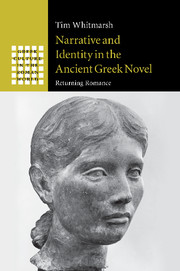Appendix: The extant romances and the larger fragments
Published online by Cambridge University Press: 03 May 2011
Summary
This appendix offers a brief guide to the surviving and fragmentary Greek romances (and related texts), together with the main editions used and the date ranges that I have assumed in this book. In every case, dating is uncertain, in some radically so; my assumptions follow current orthodoxy. I have given the titles for the romances proper in the form ‘girl's name (+ boy's name)’, which I have elsewhere argued to be the norm. Biographical testimony on the individual authors is largely unreliable. For critical discussions of these issues see especially the various essays on individual works in Schmeling ed. (2003). I list here only the editions primarily followed in this book.
Achilles Tatius, Leucippe and Clitophon. Probably mid-second century ce, on the assumption that the papyri of the late second century may have been written soon after its composition. The Suda (entry under ‘Achilles Statius’ (sic)) records that the author also composed an astronomical work, which is probably the work that survives today among the commentaries on Aratus. The Suda also claims that Achilles became a Christian bishop in later life, testimony that is widely (although not universally) suspected. More credence has been given to the Suda's claim (corroborated by the manuscript traditions) that Achilles was Alexandrian, partly on the grounds of his seemingly accurate description of Egyptian fauna; but it is possible that this assumption is merely extrapolated from the encomiastic description of the city at the beginning of book 5.
- Type
- Chapter
- Information
- Narrative and Identity in the Ancient Greek NovelReturning Romance, pp. 261 - 264Publisher: Cambridge University PressPrint publication year: 2011



